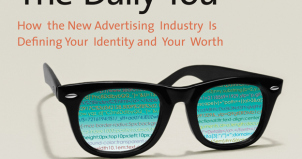You Will Like This: Online Ads and The Daily You
Advertising used to be simpler. Before the birth of cable television and the Internet, advertisements and commercials were broader entities, built for broader channels. But because we have the ability to be increasingly selective in what we consume, advertisers, marketers, and data collectors also have the ability to increasingly discern us as consumers. This is the reality Joseph Turow investigates in his book, The Daily You: How the Advertising Industry Is Defining Your Identity and Your Worth, and he raises some concerns.
“A lot of what goes on under the hood of the web is not conditioned by us — it’s created a result of a whole lot of activity by marketers that we don’t even see or know about,” explains Turow. The Daily You traces how marketers collect information through our digital activities, how it works, and how they use our online footprints to fashion profiles of who they imagine us to be as users (or buyers).
 There are both practical and philosophical issues at stake in The Daily You. Philosophically we find that our notion of privacy is something we are collectively negotiating. How do we define privacy? How do we value it? In embarking into the online marketing world, Turow describes to us what we are still in practice describing to ourselves.
There are both practical and philosophical issues at stake in The Daily You. Philosophically we find that our notion of privacy is something we are collectively negotiating. How do we define privacy? How do we value it? In embarking into the online marketing world, Turow describes to us what we are still in practice describing to ourselves.
As we are developing our habits online, technological and marketing practices are moving forward; Turow wants to draw our attention to the way this affects our experience: “In broader and broader ways, computer-generated conclusions about who we are affect the media content—the streams of commercial messages, discount offers, information, news, and entertainment—each of us confronts.” The evidence of these activities is subtle at first. “You may find you’re getting better or worse discounts on products than your friends,” writes Turow. “You may notice that some ads seem to follow you around the Internet… You may actually like some of these intrusions.”
Why might this be a problem? For Turow, this flies in the face of the “rhetoric of consumer power” in which the public is told they hold the reins when confronted with myriad choices. Yet the picture Turow paints offers the opposite idea: the options you’re shown are based on calculated notions of what you will likely choose. Turow calls it “social discrimination through profiling.” In this way, we are looking at a new sophisticated version of identity formation that is handled by advertisers.
How might that affect us? One way is though what Turow calls silos that, having built a picture of the type of information you are interested in, deny you the opportunity to show you something new that general advertising does not assume. Silos then reinforce habits you may already have, or limit the options you believe you have. As Turow puts it, “If you consistently get ads for low-priced cars, regional vacations, fast-food restaurants, and other products that reflect a lower-class status, your sense of the world’s opportunities may be barrow than that of someone who is feted with ads for national or international trips and luxury products.” This concern is not limited to advertising either, but Turow points to similar developments in digital news media so that the way we learn about the world is too targeted and profiled by marketers. Different people may get different headlines, reflecting back to them what they have digitally “proven” they will click on.
What do we value in this increasingly interactive form of online communication? Do we know what is at stake in our daily practices? The Daily You offers us a way to start thinking about this by helping us be aware of what invisible marks we make in our online lives, and how those might be building a picture of ourselves. Having recognized this may be increasingly true, it will be up to us to decide how it will matter to us.




